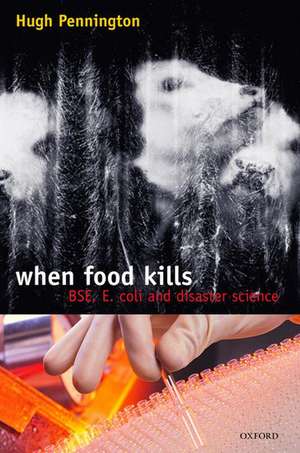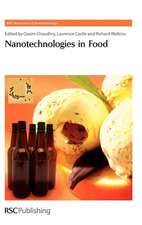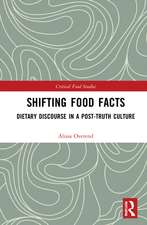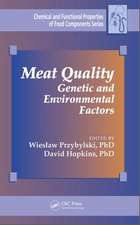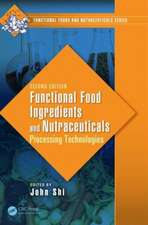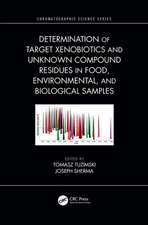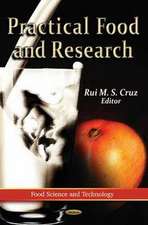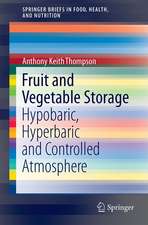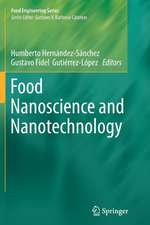When Food Kills: BSE, E.coli and disaster science
Autor T. Hugh Penningtonen Limba Engleză Hardback – 18 sep 2003
Preț: 534.28 lei
Preț vechi: 765.88 lei
-30% Nou
Puncte Express: 801
Preț estimativ în valută:
102.25€ • 106.21$ • 84.93£
102.25€ • 106.21$ • 84.93£
Carte tipărită la comandă
Livrare economică 22-28 ianuarie 25
Preluare comenzi: 021 569.72.76
Specificații
ISBN-13: 9780198525172
ISBN-10: 0198525176
Pagini: 240
Ilustrații: numerous halftones and 6 line drawings
Dimensiuni: 161 x 240 x 18 mm
Greutate: 0.58 kg
Editura: OUP OXFORD
Colecția OUP Oxford
Locul publicării:Oxford, United Kingdom
ISBN-10: 0198525176
Pagini: 240
Ilustrații: numerous halftones and 6 line drawings
Dimensiuni: 161 x 240 x 18 mm
Greutate: 0.58 kg
Editura: OUP OXFORD
Colecția OUP Oxford
Locul publicării:Oxford, United Kingdom
Recenzii
Pennington writes with intimate knowledge not only of the science but also of regulations and committees ... Very well informed and wide-ranging.
... a fascinating read, packed with wry observations of human social behaviour ... The book is informative and thought-provoking and I recommend it highly for any who might be under the spotlight next time there is a microbiological disaster - which there will be!
.... he embraces the historical, legal and scientific aspects of his subject, though he is best when dealing with the political aspects
... a thought-provoking and in-depth look at a handful of relatively recent food scares in Britain - including the outbreak of E. coli 0157 and the emergence of variant CJD.
This book has a refreshing underlying belief in the possibility of progress.
Pennington's passionate commitment to the explanatory power of scientific understanding is the laudable central quality that gives this book undeniable importance and relevance.
Pennington has written a defence of science in the service of society that is as accessible to the general reader as it is timely and of great importance.
... memorable examples of the human propensity to ignore danger signals until it is too late.
Consumers' interest in food is at an all time high ... However, there is also a great deal of misinformation in the general media. Hugh Pennington's reputation for independence and sound science will carry weight with the target audience.
Riveting is not a word to use lightly, in a review or anywhere else. But it is exactly the word for Professor Hugh Pennington's forensic filleting of cases.
His careful, sleuth-like, and entertaining documentation of events shows that the two things that helped E-coli and BSE cause so much harm was " a failure to learn from history, and failure to understand science".
Pennington's detailed reconstruction of the E.coli outbreak in Scotland in 1996 and the origins of BSE makes clear how much is at stake. It also makes an important contribution to the growing revisionist debate about whether eating infected meat is really the cause of BSE and vCJD.
... a fascinating read, packed with wry observations of human social behaviour ... The book is informative and thought-provoking and I recommend it highly for any who might be under the spotlight next time there is a microbiological disaster - which there will be!
.... he embraces the historical, legal and scientific aspects of his subject, though he is best when dealing with the political aspects
... a thought-provoking and in-depth look at a handful of relatively recent food scares in Britain - including the outbreak of E. coli 0157 and the emergence of variant CJD.
This book has a refreshing underlying belief in the possibility of progress.
Pennington's passionate commitment to the explanatory power of scientific understanding is the laudable central quality that gives this book undeniable importance and relevance.
Pennington has written a defence of science in the service of society that is as accessible to the general reader as it is timely and of great importance.
... memorable examples of the human propensity to ignore danger signals until it is too late.
Consumers' interest in food is at an all time high ... However, there is also a great deal of misinformation in the general media. Hugh Pennington's reputation for independence and sound science will carry weight with the target audience.
Riveting is not a word to use lightly, in a review or anywhere else. But it is exactly the word for Professor Hugh Pennington's forensic filleting of cases.
His careful, sleuth-like, and entertaining documentation of events shows that the two things that helped E-coli and BSE cause so much harm was " a failure to learn from history, and failure to understand science".
Pennington's detailed reconstruction of the E.coli outbreak in Scotland in 1996 and the origins of BSE makes clear how much is at stake. It also makes an important contribution to the growing revisionist debate about whether eating infected meat is really the cause of BSE and vCJD.
Notă biografică
Professor T.H. Pennington is Head of Department of Medical Microbiology, and a frequent commentator on radio and television where his opinion is sought on a wide range of infectious diseases ranging from necrotising fasciitis (the infamous and much-hyped flesh eating bacteria) to smallpox. His particular expertise lies in the science of food poisoning and the links between science, policy and the media.He is perhaps best known for the Pennington Group Report, on the circumstances leading to the 1996 outbreak of infection with E.coli O157 in Central Scotland. Pennington led the independent inquiry that was set up at the time, amidst a blaze of publicity.
